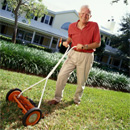 Here’s some interesting news on the cardiovascular disease front: helping others may lower the risk of developing new, potentially life-threatening symptoms. Cardiovascular disease can be a complex condition to treat, as it has its roots in so many different areas. Lifestyle factors such as diet and exercise can play a big role in whether or not you get heart disease. A diet full of unhealthy fats and sugars can up your cholesterol levels, while a lack of exercise can contribute to obesity and more stress placed on the heart.
Here’s some interesting news on the cardiovascular disease front: helping others may lower the risk of developing new, potentially life-threatening symptoms. Cardiovascular disease can be a complex condition to treat, as it has its roots in so many different areas. Lifestyle factors such as diet and exercise can play a big role in whether or not you get heart disease. A diet full of unhealthy fats and sugars can up your cholesterol levels, while a lack of exercise can contribute to obesity and more stress placed on the heart.
Work or family-related stress can also lead to high blood pressure. Sometimes cardiovascular disease is ushered in by other health problems like diabetes.
But whatever the cause, heart disease is both a tricky and hopeful disease to treat. Taking responsibility to change lifestyle factors to improve heart health can be hard work, but can be effective. Taking medications, while often necessary, can cause unwanted side effects. Every once in a while, however, a remedy comes along where everyone seems to benefit. Such is the case when it comes to helping others, according to researchers in Ann Arbor, Michigan.
The U.S. research team conducted a survey to examine the health effects of helping others in adults with cardiovascular disease. Specifically, they looked at adults with cardiovascular disease who provided non-paid assistance to family and friends.
The researchers discovered that cardiovascular disease patients who spent up to 200 hours over a 12-month period helping others showed lower odds of experiencing a cardiovascular disease event or dying in the subsequent two years. Providing up to 100 hours of assistance was associated with reporting fewer depressive symptoms. The researchers concluded that patients with cardiovascular
disease can provide beneficial levels of assistance to others in their own social networks or communities, thereby also improving their own health.
Food for thought: consider boosting your mental and physical health by setting aside some time to help family or friends. What a great way to get some cardiac care. Of course, if you have cardiovascular disease, don’t overdo it! Remember that the participants in the study averaged about four hours of help a week.
To learn about how volunteering could also benefit your health, read the article Volunteering Can Make You Healthier.
